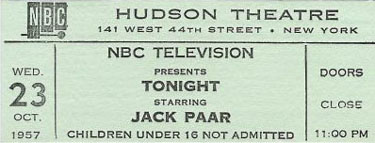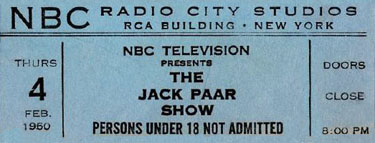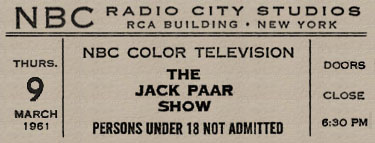Tonight (1957-1962)



Steve Allen hosted his final episode of Tonight on January 25, 1957. The following Monday, NBC debuted a new multi-hosted, “magazine” show in the time slot…Tonight: America After Dark. It was an instant flop and they hurriedly began searching for someone who could do a new version of Tonight more like the old version. The logical choice might have been Ernie Kovacs, who’d hosted two nights a week during the final months of Allen’s run…but Kovacs was off in Hollywood appearing in movies and therefore unavailable. Instead, they picked Jack Paar, who had hosted a dizzying array of short-lived programs for all the networks in the preceding years. He took over NBC’s late night time slot on July 29, 1957.
The early Paar Tonight program was a mess. At one point before its debut, someone at NBC got the brilliant idea that it should consist of three separate game shows. Each night, the contestant who won the first would move on to appear on the second…and so forth. This notion was discarded, in part because America After Dark was sinking fast and there wasn’t the time to develop three new game shows. So they went with the idea of conversation/chat show but even then, NBC wanted to save a tiny amount of money by booking guests a week at a time — the same people for five nights in a row. This too was discarded but for the initial weeks, Paar struggled to make conversation with eccentric guests in whom he had no interest. Further souring the proceedings was the man selected as Paar’s sidekick, veteran comic actor Franklin Pangborn. Pangborn had been funny in scripted film parts but on a live, ad-lib show he was a disaster.
For several months, Paar teetered on the brink of cancellation but then everything miraculously came together. Pangborn was eliminated and eventually, the show’s announcer — Hugh Downs — expanded his role to full sidekick status. And Paar found his style and the right kind of guest to have on. He soon had a whole stock company of recurring visitors that included Alexander King, Oscar Levant, Dody Goodman, Jonathan Winters, Peter Ustinov, Hans Conried, Zsa Zsa Gabor, Elsa Maxwell, Cliff “Charlie Weaver” Arquette and Peggy Cass.
In these tickets, one can see things changing. Paar didn’t like staying up late — he once said he’d never watch his show if he hadn’t been on it — so when taping became more practical, it went from a live show to one recorded earlier and earlier in the evening. For some reason, as they moved it earlier, they decided to raise the minimum audience age from 16 to 18.
But the big change was in the name. Few recall that there were a few years there when Tonight ceased to exist and it became just The Jack Paar Show, though many people, Paar included, continued to refer to it as “The Tonight Show,” which technically had not yet been its name. It was just Tonight. As you can see from the above ticket for 2/4/60, it was The Jack Paar Show then. Exactly one week later — 2/11 — Paar did his famous on-air resignation because the network had censored an innocuous joke about a “water closet” and what he said when he quit for several weeks was, “I’m leaving The Tonight Show.” Before that, there had also been a brief interim period when its title had been Jack Paar Tonight. (Paar’s unsuccessful attempt to return to the format in 1973 would be called Jack Paar Tonite.) In Paar’s final months, NBC did all it could to get the word “Tonight” back into promotions and TV Guide and to pretend that that had been the name all along.
Paar did his final show in the time slot on March 30, 1962, and the show was handed over to guest hosts for six months to await the arrival of Johnny Carson. After a brief hiatus, he returned to NBC with a shorter but largely identical weekly prime time series called The Jack Paar Program that ran until 1965.






